Tourism is the world’s largest export, yet it is ephemeral, produced within an encounter, usually fleeting, between host and guest. It has enormous growth potential; almost every country desires an expansion in this sector.
Yet whether and how to grow is not nearly as straightforward as one might hope.
Because each tourist and each native brings along a unique jumble of expectations, knowledge, power, and aspirations, multiplying tourist encounters transforms the tourist and the native, and can permanently alter the social and political contexts in which they live.
